Rick Wayne's Blog, page 23
April 13, 2020
April 12, 2020
The Original Resistance
[image error]
The story of the Buddha’s enlightenment is really one of the most powerful in world literature and I wish it was as well known in the West as, say, the story of the Exodus or the Crucifixion. Your average Westerner can look on an image of a bearded, robed man holding a pair of clay tablets and parse the encoded meaning (law, authority, revelation) without thought. With one glance, we are immediately reminded of an entire way of life, where it’s not necessary that we be able to recite all of the Ten Commandments to yet have a keen sense of how we are supposed to behave.
But the meaning of the image of a man sitting cross-legged under a tree, while perhaps identifiable as Buddhist, will be tied up with Western ideology: that it’s a quaint religion, that it shares in an earlier polytheism, that it’s a hippie peacenik faith maladapted to “the harsh realities of life,” and so on, without knowing the significance of the hooded snake, the topknot, the rags, the seated position, and — most importantly — the hand that touches the earth. Everything important the artist intended to communicate is largely lost on us.
The hand in particular is an image that still gives me goosebumps. It is, for me, the greatest act of nonviolent resistance in history. It’s Gandhi on the Salt March. It’s Rosa Parks on the bus. It’s Wounded Knee. It’s what Mark Millar was channeling with Cap’s speech in Civil War about planting yourself like a tree — which the Buddha does, his feet entwined like roots.
While the image of Christ on the Cross is also extremely powerful, it sends a different message: the endurance of suffering — surely important in an ever-imperfect world, and something I wish the peddlers of rage would heed, but for me, it is a waiting: the worship of passive resignation, the acceptance of that which you wish were different but isn’t.
Christians can object, and they wouldn’t be wrong. Symbology has no bounds. But it’s hard to argue that the core of Christianity isn’t a variant of the Stoicism it borrowed from its Graeco-Roman forebears. That Stoicism is enshrined in the famous Protestant work ethic — that this life matters less than the hereafter; that since the original sin, it’s the nature of man to suffer; that it’s your job to shut up and do your work.
The Bible says as much:
18 Servants, be submissive to your masters with all respect, not only to those who are good and gentle, but also to those who are unreasonable. 19 For this finds favor, if for the sake of conscience toward God a man bears up under sorrows when suffering unjustly. 20 For what credit is there if, when you sin and are harshly treated, you endure it with patience? But if when you do what is right and suffer for it you patiently endure it, this finds favor with God. (1 Peter 2)
I prefer the image above (more below), also of a poor man dressed in rags, having abandoned wealth and title, with not a single possession to his name, assaulted by every evil and injustice in the world. But where Christ suffers and dies, The Buddha touches the earth and says “I am here, just as deserved as thee. And I will not be moved.”
The following is taken from Joseph Campbell’s description of the Enlightenment in his book The Hero with a Thousand Faces:
A majestic representation of the difficulties of the hero—task, and
of its sublime import when it is profoundly conceived and solemnly
undertaken, is presented in the traditional legend of the Great Strug—
gle of the Buddha. The young prince Gautama Shakyamuni set forth
secretly from his father’s palace on the princely steed Kanthaka,
passed miraculously through the guarded gate, rode through the
night attended by the torches of four times sixty thousand divinities,
lightly hurdled a majestic river eleven hundred and twenty-eight
cubits wide, and then with a single sword-stroke sheared his own
royal locks—whereupon the remaining hair, two finger-breadths in
length, curled to the right and lay close to his head. Assuming the
garments of a monk, he moved as a beggar through the world, and
during these years of apparently aimless wandering acquired and
transcended the eight stages of meditation. He retired to a hermit-
age, bent his powers six more years to the great struggle, carried
austerity to the Uttermost, and collapsed in seeming death, but pres-
ently recovered. Then he returned to the less rigorous life of the
ascetic wanderer.
One day he sat beneath a tree, contemplating the eastern quar—
ter of the world, and the tree was illuminated with his radiance. A
young girl named Sujata came and presented milk-rice to him in
a golden bowl, and when he tossed the empty bowl into a river it
floated upstream. This was the signal that the moment of his triumph
was at hand. He arose and proceeded along a road which the gods
had decked and which was eleven hundred and twenty-eight cubits
wide. The snakes and birds and the divinities of the woods and fields
did him homage with flowers and celestial perfumes, heavenly choirs
poured forth music, the ten thousand worlds were filled with per-
fumes, garlands, harmonies, and showers of acclaim; for he was on his
way to the great Tree of Enlightenment, the Bo Tree, under which
he was to redeem the universe. He placed himself, with a firm resolve,
beneath the Bo Tree, on the Immovable Spot, and straightway was
approached by Kama-Mara, the god of love and death.
The dangerous god appeared mounted on an elephant and carry—
ing weapons in his thousand hands. He was surrounded by his army,
which extended twelve leagues before him, twelve to the right, twelve
to the left, and in the rear as far as to the confines of the world; it was
nine leagues high. The protecting deities of the universe took flight,
but the Future Buddha remained unmoved beneath the Tree. And
the god then assailed him, seeking to break his concentration.
Whirlwind, rocks, thunder and flame, smoking weapons with
keen edges, burning coals, hot ashes, boiling mud, blistering sands
and fourfold darkness, the Antagonist hurled against the Savior,
but the missiles were all transformed into celestial flowers and oint-
ments by the power of Gautama’s ten perfections. Kama-Mara then
deployed his daughters, Desire, Pining, and Lust, surrounded by
voluptuous attendants, but the mind of the Great Being was not
distracted. The god finally challenged his right to be sitting on the
Immovable Spot, hung his razor-sharp discus angrily, and bid the
towering host of the army to let fly at him with mountain crags.
But the Future Buddha only moved his hand to touch the ground
with his fingertips, and thus bid the goddess Earth bear Witness to
his right to be sitting where he was. She did so with a hundred,
a thousand, a hundred thousand roars, so that the elephant of the
Antagonist fell upon its knees in obeisance to the Future Buddha.
The army was immediately dispersed, and the gods of all the worlds
scattered garlands.
Having won that preliminary victory before sunset, the con—
queror acquired in the first watch of the night knowledge of his pre—
vious existences, in the second watch the divine eye of omniscient
vision, and in the last watch understanding of the chain of causation.
He experienced perfect enlightenment at the break of day.
Then for seven days Gautama—now the Buddha, the Enlightened—
sat motionless in bliss; for seven days he stood apart and
regarded the spot on which he had received enlightenment; for seven
days he paced between the place of the sitting and the place of the
standing; for seven days he abode in a pavilion furnished by the gods
and reviewed the whole doctrine of causality and release; for seven
days he sat beneath the tree where the girl Sujata had brought him
milk-rice in a golden bowl, and there meditated on the doctrine of
the sweetness of nirvana; he removed to another tree and a great
storm raged for seven days, but the King of Serpents emerged from
the roots and protected the Buddha with his expanded hood; finally,
the Buddha sat for seven days beneath a fourth tree enjoying still the
sweetness of liberation. Then he doubted whether his message could
be communicated, and he thought to retain the wisdom for himself;
but the god Brahma descended from the zenith to implore that he
should become the teacher of gods and men. The Buddha was thus
persuaded to proclaim the path. And he went back into the cities of
men where he moved among the citizens of the world, bestowing the
inestimable boon of the knowledge of the Way.
The Buddha’s enlightenment is the most important single moment in Oriental mythology, a counterpart of the Crucifixion of the West. The Buddha beneath the Tree of Enlightenment (the Bo Tree) and Christ on Holy Rood (the Tree of Redemption) are analogous figures, incorporating an archetypal World Savior/World Tree motif, which is of immemorial antiquity. Many other variants of the theme will be found among the episodes to come. The lmmovable Spot and Mount Calvary are images of the World Navel, or World Axis (see page 32).
The calling of the Earth to witness is represented in traditional Buddhist art by images of the Buddha, sitting in the classic Buddha posture, with the right hand resting on the right knee and its fingers lightly touching the ground.



April 10, 2020
(Art) The Spectacular Sci-fi VFX of Antoine Collignon
[image error]
The VFX images of Spanish concept artist Antoine Collignon are spectacular both for their cinematic realism and their dramatic composition, where the focal point places the viewer right in the middle of the action.
Find more by the artist on his website.








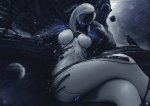







April 8, 2020
(Fiction) Killing Machine
[image error]
“Number please?”
“I’d like to make a collect call to a solo register.”
“What’s the name?
“Samizdat Zellner. In Chicago.”
“Pass phrase, please.”
“I’ll be back.”
Nio heard sounds of frantic typing.
“Hold please.”
After several clicks and a long silence, where Nio was certain the operator was having an extremely frustrating conversation with the five-year-old fugitive in her apartment, the phone finally rang.
“Semmi, listen to me,” she said as soon as it stopped.
“Where are you that you need to call me on an encrypted line? Should I be worried? The neighbor woman knocked again this morning and I had to hide under the table for seven hours.”
“I’m sure Mrs. Coleman wasn’t at the door for seven hours.”
“I wanted to be certain to nine significant digits. I still think she works for Cybercommand.”
“Mrs. Coleman is 73. She does not work for the US military.”
Despite that no one in the office was near, Nio was conscious of what she said aloud in the station. She chose to use the vaguer term ‘military.’
“Then why doe she have so many weapons? I can see the X-ray scatter.”
“Those are probably kitchen knives.”
“And a handgun.”
“I’m not sure if you realize it, Semz, but you didn’t exactly pick the safest neighborhood.”
“I chose it because, statistically, there is a very low chance they will look for me here. You didn’t tell me where you are. This line is route-encrypted, so I am unable to identify the number from which you called.”
“I’m in a little town in South Dakota.”
“What are you doing in South Dakota? The rent is due on Tuesday.”
“Look. I’m gonna tell you, and I need you to not freak out. Okay?”
“Tell me what? You said you would be back in the morning. Have we been discovered?”
“No,” she said softly into the receiver. “And there’s no reason to worry.”
“Then why won’t you tell me?”
Nio sighed. “I’m calling from the Brown County Sheriff’s Office.”
“Are you hurt? Has a crime been committed to your person?”
“I’m fine. Thank you for asking, Sem. Very well done.”
“I am testing a new protocol for human interaction. Would you say that I am doing well, fair, or poorly so far?”
“Sem. Listen to me. I’ve sorta been arrested.”
There was a pause. “They’re going to lynch you.”
“No. No, Semmi, you need to calm down.”
“They’re going to lynch you.”
“No one is going to lynch me. Where did you even hear about that?”
“The History Channel.”
“I don’t think—”
“That’s how it is in those small towns.”
“Semmi—”
“They’ll leave your cell unlocked and then—”
“SEMMI!”
The women working in the station stopped and turned.
“Sem, I need you to listen to me. I need you to call Mutiny, okay? I don’t know her number.”
“It’s in your phone.”
Nio touched the bridge of her nose. “I don’t have my phone.”
“YOU DON’T HAVE YOUR PHONE? HOW WILL I CONTACT YOU?”
“Sem—”
“What if the landlord comes and you’re not here? He’ll come in on his own. He has a key. I need to bar the door.”
“Semz, what are we practicing?”
“How to be calm.”
“Are you calm?”
A pause.
“Yes.”
“I lost my phone. That’s all. It’s no big deal.”
Nio omitted that it slipped out of her coat when she whipped it off the basement floor and subsequently burned in the house fire she set herself.
“I told you not to go chasing phantoms on the internet,” he said.
“Sem, I need you to look around the apartment and find the number. Call Mutiny, okay?”
“Why can’t you call her?”
“Because I only get one phone call and I didn’t memorize her direct line and I wanted to check on you. I need you to find the number and call her. Don’t call the number off the internet. That will just go to her manager. He never liked me and may or may not pass on the message in a timely manner. Do you understand?”
“What do I tell her?”
“Tell her where I am and that I need a lawyer.”
“Should I tell her about the lynchings?”
“I’m sure she knows all about that.”
“Because I would definitely want to impress upon her the urgency of the situation.”
“Semz?”
“Yes?”
“Promise me you’ll call her.”
“I promise.”
“Today, Sem. Before watching The Terminator.”
“Okay. I promise I will call Mutiny Ali today and tell her you are being held captive by potential facists in South Dakota. I will not tell her about the immanent threat of lynching.”
“Thank you.”
“How long will you be gone?”
“I’m not sure. But if you call Mutiny today and I can get a good lawyer, I might be arraigned by the end of the week.”
“THE END OF THE WEEK! What will I do until then?”
“Semmi, you don’t eat, sleep, or leave the apartment. You’re going to be fine.”
“I paint.”
“That’s true. Do you have enough paint to last you?”
“If I am careful. But this was not the arrangement we made with IDEOLEX. You promised—”
“I know what I promised. And I’m sure I’ll hear about it from the Lex if you tell them, so please don’t. At least give me until you run out of paint. Fair?”
Silence.
“Semmi, I’m really, really sorry. I didn’t expect—Look, the important thing is, we’re both okay and as far as we could possibly know, nothing has changed.”
Silence.
“Semmi, man, I know this is upsetting, and I know how you are, and I know you’re probably very angry with me right now, but calling the Lex isn’t gonna help. They aren’t gonna come over and watch The Terminator with you, are they?”
Still nothing.
“Sem, I know I said I’d be there, but I can’t unless I get out of here, and I can’t do that unless you call Mutiny.”
Silence.
“Semz?”
The operator returned. “The payment on this call has been canceled. Have a nice day.”
Click.
–from my current WIP. You can read the previous chapter here.
April 7, 2020
(Art) The Nordic Folklore Illustration of John Bauer
‘Look at them,’ mother Troll said. ‘Look at my sons! You won’t find more beautiful trolls on this side of the moon’
[image error]
John Albert Bauer (1882–1918) was a Swedish painter and illustrator best known for his depictions of Nordic mythology, but he also composed landscapes and portraits. Bauer was born and raised in Jönköping but at 16 moved to Stockholm to study at the Royal Swedish Academy of Arts, where he received his first commissions to illustrate books and magazines. While at school, he met fellow artist Ester Ellqvist, whom he married in 1906.
Bauer traveled throughout Lappland, Germany, and Italy early in his career, and these travels influenced his work, especially the Italian Renaissance and art of the Sami cultures. He died at 36, along with his wife and son, when the ship on which they were traveling sank on Lake Vättern.
The stark contrasts in his images — depicting magical happenings in a bleak landscape, or childlike figures in muted color — gives them a menace appropriate to fairy tales, which can often be quite grim. The photo-like composition, where his subjects often appear to be posing or otherwise frozen, makes his pictures seem time-less, as in existing outside time.

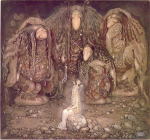

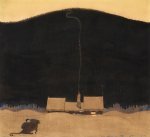
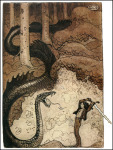
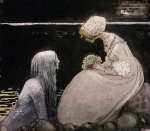
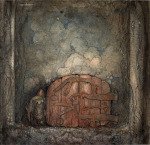
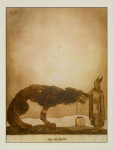


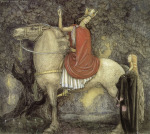



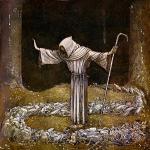
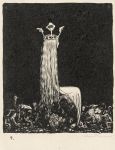
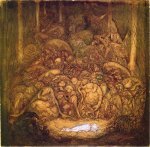

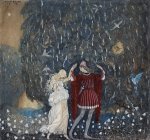
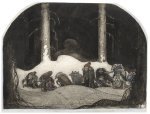


April 6, 2020
I dunno about the rest of you, but I’m finding it very h...
[image error]
I dunno about the rest of you, but I’m finding it very hard to concentrate these days.
I’m not freaking out. But I am distracted. I feel introspective, and yet my attention is fickle. My mind’s eye is wide but constantly diverted.
It feels like sensory overload without the overload, as if my cognitive capacity has shrunk and my immediate circumstances are enough to send me into my cave — all of which makes it impossible to maintain the kind of coherence necessary to plot a novel.
cover image: My Head Is On Fire by Fulvio di Piazza
April 3, 2020
(Art) The Neon Dreams of Nick Sullo
[image error]
Despite being somewhat stylistically derivative of the stock cyberpunk aesthetic (as well as artists like Beeple and Josan Gonzales), the illustrations of professional VFX artist Nick Sullo — who worked on the original Stranger Things back before anyone knew it — are definitively mesmerizing for their stunning use of neon.


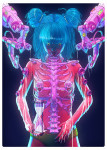




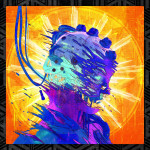



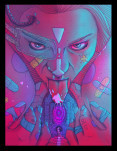
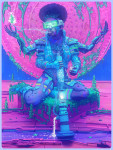






April 2, 2020
April 1, 2020
(Art) The Spec Art of COVID-19
[image error]
The speculative artists and game designers on ArtStation and DeviantArt have been busy during the confinement documenting the crisis in fantastical images. I’m sure there’s more to come.
Work by Mohammad Attaran, Beeple, TJ Foo, Christopher Bretz, Gediminas Skyrius, Tarmo Juhola, Andy Lefton, Liz Sun, Yasser Choubiqui, Francesco Lorenzetti, Abdulazziz Abdullah, Ridraksh Jain, Suvamjyoti Panda, and Christon Clive. Check out their pages for more.

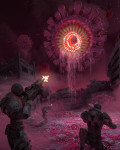

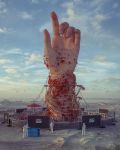
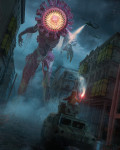

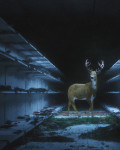
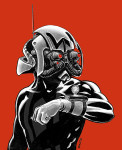


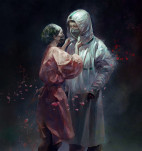
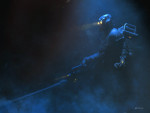





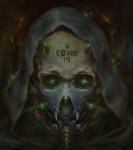
March 30, 2020
(Fiction) Blackout!
[image error]
When I wrote Episode Four of THE MINUS FACTION back in 2015, I wondered whether a breakdown in the normal order, like a blackout, would create suspense — whether readers, who seem to live most days with an expectation of safety, would accept that we were really as close to disorder as John and the team worry. I think I got it right.
“Shit!” Ian threw the video game controller across the floor, crossed his arms, and retreated to the back of the couch, sulking.
“Woohoo!” Wink jumped, controller in hand, over and over in front of him. She waggled her butt as she danced. “That’s eighty-six to ZEE-ROH.” She pointed and mockingly rolled her finger back and forth.
“Whatever.”
Xana was sitting next to Ian with a stack of six pizza boxes on her lap. She swallowed a bite and scowled at the screens on the wall. “What’s the point of that game?”
“To humiliate me,” Ian fumed.
John rolled to a stop and Xana handed him a piece of pizza. Everyone knew he’d left to replace his colostomy bag, but no one said anything.
“What’s our status?” he asked the girl.
Wink was mimicking an athlete’s victory dance. “Virus is loaded and running.” She shook a finger at Ian and moved her hips back and forth with each word. “We-should-be-live-after-dinner.”
“Good.” John took nearly half the slice in his mouth and turned his chair toward the kitchen.
The lights went off.
Everyone waited for a moment, expecting them to come back on. But they didn’t.
“Wink?” Ian asked.
The little girl looked at the ceiling.
“Were we supposed to lose power out here?”
The little girl didn’t move. Everyone waited.
Nothing.
“Wink?” John asked.
Still she was silent.
Still nothing happened.
Ian stood. He looked to the girl. He looked to the TVs. He looked back to the girl.
She was worried.
“Oh shit . . .” Ian had both his hands on his head. “Did we just do what I think we just did?”
“What happened?” Xana asked.
“Holy fuck.” Ian walked in a circle. “We just blacked out the city.”
“Wink!” Xana chided.
The little girl ran to her computer workstation on the other side of the hall. “It’s not my fault!”
“What happened?” John was trying to keep everyone calm.
Wink sat and started typing. Her computer screens, running on battery power, clicked on.
“Wink?”
“I don’t know!”
“Then how do you know it’s not your fault?” Xana asked.
“Because you guys rushed me! If we’d just stuck to the plan like Prophet wanted us to, then—”
“Wink,” John interrupted calmly. “Keep looking. Find out what happened.” He turned to the others. “Shut up and let her work.”
“I can’t. Everything is down. The Internet. Wireless. Servers. Everything.”
“All right. Then what do you think happ—”
“I DON’T KNOW!”
“Guess,” John urged.
The little girl bit her lip. “I dunno. Maybe if their security was like five years old or something, then it wouldn’t have caught the kind of replicating subroutine I was using. But no one important uses anything that old!”
Ian shrugged. “I worked for a lot of companies with legacy tech.” Five years probably seemed like an eternity to an eleven year-old. “We are talking about the utility infrastructure after all.”
“I didn’t have time to do a full analysis! This is what I was talking about. This is why Prophet said.” Wink turned and leaned into her words. Her little hands made fists. “You all were rushing me and—”
“No one’s accusing anybody of anything.” John rolled between them and raised his hands in the dim light, even his left, burnt and shriveled and shaking. “Okay? This is an accident. We changed the plan”—he looked at Ian—“and this is what happens.” Back to Wink.
“I’m sorry.” Ian was contrite. “I wasn’t trying to blame you.”
“How bad is it?” Xana asked.
“It’s bad!” Wink objected. “Everything’s down. The whole city. At least up to Stamford.”
“Connecticut?”
“Turn on the police radio.” John tried to stay calm.
Ian walked to the Mast and tuned the police scanner. Everyone gathered around. They listened in silence as the entire NYPD was mobilized. Plans were being made to drive by the homes of those who were off duty. Everyone had to come in. The subway was down. Phones were down. So were most cell towers. Overwhelming traffic crashed the remainder.
Without power, traffic lights were blinking. Huge chunks of Manhattan and the surrounding boroughs were immediately, immovably gridlocked. Buses and taxis were trapped. Experts at headquarters were warning the precincts that without public transportation, commuters would soon flood the streets and bridges in order to walk home. Most people with cars would stay with them and wait for traffic to clear (hours hence), but some would abandon their vehicles, particularly in places with a high fear factor like tunnels and bridges. The stationary cars would act as barricades and create choke points, exacerbating the gridlock.
Without power, ventilation systems would stop, buildings and apartment towers would get stuffy, and people would gather on the roads and sidewalks. With nothing to do, many would smoke and drink, and in such close quarters, arguments would break out. Some would turn violent. A few would escalate.
Most banks had back-up systems and would be secure, but jewelry and grocery stores, large retail outlets, or any place with a lot of cash on hand would be vulnerable to looting.
“And somewhere out there,” a gruff female captain warned, “is a pregnant woman trying to get to a hos—”
John waved and Ian turned it off.
Cap turned to Wink. “How long until they can get things up and running?”
She chewed her lip. “The virus corrupts their command code, but it hides in their OS. They’re going to have to do a complete system wipe—”
“Wink,” John interrupted patiently. “How long?”
The little girl’s eyes flicked back and forth as her mind ran a simulation. An hour to diagnose the problem. Three hours to wipe and reinstall. Then configuration and several waves of high-level system tests, each with a twenty- to forty-minute cycle time.
“Twelve hours.”
“Jesus . . .” Ian turned and took a step back.
“But that’s only if everything goes as planned.”
“And if not?” John asked.
“Maybe a day.” The girl was sheepish. She looked like she wanted to cry. “This is bad, isn’t it?” Her voice was soft. Her next question was barely a whisper. “Will people get hurt?”
“Hey!” John called her to attention. “This isn’t your fault. You did what you were asked to do. This is my mission. It was my decision. It’s my responsibility. Understand?”
Wink nodded, but without conviction.
Ian was antsy. “Cap, we gotta do something.”
John looked at Xana. The big woman was staring out the windows near the ceiling.
“You okay, Xan?”
She didn’t meet his gaze. “We have brownouts in my country. Always in the afternoon, if they can help it, when it’s hot and people stay indoors. But sometimes there is a problem and the power goes out at night, when it’s late. They try to enforce a curfew but . . .” She turned to John. “People are always worse in the dark.”
Ian looked at the clock on the wall. “It’ll be dark in three hours.”
“Ian is right, Captain. We must do something.”
John had seen enough of the world to have a sense of how it would go. At first nothing much would happen. People would expect the power back shortly. When that didn’t happen, some of them would test the waters, see what they could get away with. If they met enough resistance, they’d back down and order would more or less hold.
But, if they broke free, others would join them, and whole neighborhoods would riot. Under the arch of darkness, without street lamps and lighted buildings, all manner of depravity could surface. The weak and defenseless would be victimized first.
Everyone looked at John. They waited.
“Hospitals and emergency services all have back-up generators,” he said. “The police band will be active. We can listen in.”
“But how will they even know?” Ian asked. “Landline phones need power, and the cell towers are jammed. How can anyone call for help?”
Wink’s mind ran with the spark. “The Faction has the best hackers in the world. They’ve spoofed every kind of telephony software ever made. I can reconfigure the drones to act as mini cell towers, but taking only 911 calls. We can park them at key points in the city and route incoming calls to the police using the radio in the Mast. Not only will people with cell phones be able to get calls to the police, but we’ll be able to monitor all the traffic.”
John sat back. “Pretty clever, kid.”
“And I’ll run it all through Prophet. We can target the cases where the police won’t make it in time.”
Ian was skeptical. “Can he really see the future?”
Wink nodded, wide-eyed. “But not that far. And not perfectly. Just, like, probabilities for the immediate future. After that there’s too much uncertainty.”
“How long?” John asked.
“Depends. A few seconds usually, up to a minute or two in some cases.”
“No. How long to configure the drones?”
“Right!” Wink jumped up to get the parts she needed. She yelled as she ran. “If Moron drives I can do it on the way!”
John nodded to the team. “Everybody grab your gear. We’ll suit up en route.”
§ § §
“No, Brad, I won’t be quiet.” Jennifer Torgerrin pointed to the brand-new diesel generator, a twenty-foot, gray-and-white rectangular block wrapped in plastic and resting on pallets at the far end of the parking lot. The orange light of the setting sun cast long shadows on the pavement. “This is exactly why I wanted to do this last year.”
“This is a freak occurrence.” Bradford McRae was a tall black man with a goatee and a fitted suit. “The old generator is still within its depre—”
“Don’t you dare say depreciation window!”
Brad ran a hand over his shaved head.
“Depreciation is a tax concept. You understand that, right?” Jenn was a big woman with a round face, little makeup, and graying brown hair. “Whether the old generator had legally depreciated or not doesn’t change its—”
“I understand that, Jenn, but we replaced a lot of other equipment last year, including the MRI machine. This hospital has a budget.”
“This hospital makes money.”
“This hospital is the least profitable in the network. I was brought on—”
“But it still makes money. We all don’t come in to work everyday to make a profit. On sick people.”
“Yes.” Bradford was stoic. “We do.”
Jenn shut her lips before saying something that would get her fired.
“We are a for-profit company. That’s exactly what we do.” Brad had seen this coming. This was the problem with internal promotions. Jenn was a former social worker who had moved into upper administration. He needed someone from corporate in that role. “I don’t love the idea, but you know I don’t make the rules.”
“Said every bureaucrat ever.”
“Insulting me isn’t going to change anything.”
A milling crowd had gathered outside to escape the dark halls of the hospital. An ambulance chirped; people moved out of the way as it pulled into the lot and parked on the far side of the generator. It was a new model, a wide-bodied search-and-rescue variant. It was huge.
Bradford scowled. It wasn’t one of theirs. And if they were dropping off, they would have pulled into the ER. He pointed at the vehicle and turned to his assistant, Jayne. “All units are supposed to be on the streets. Get them out of here.”
Jenn stepped into his line of view. “Are you listening to me?”
Bradford ignored her. “Jayne.”
“But what do you want me to do?” the young woman asked.
“Go tell them they can’t park here.”
“Brad!” Jenn insisted.
The tall man turned back to her. “There’s nothing I can do! For Christ’s sake, Jenn.” He pointed to the distant New York skyline.
Jenn pointed in retaliation to the dark windows of the eight-story tower behind him. “Go upstairs and tell that to our dialysis patients.” She already had. She’d walked the halls with the head of nursing while Brad—following company protocol—backed up his files before his computer battery died. When Jenn reached the cafeteria, she’d ordered the staff to clean out the ice cream and give it to the patients. Kids first.
“We have time. We can get them to other hospitals.”
“How?” Jenn stepped forward. She wanted to punch him. “The stoplights are out. The city is a parking lot.”
Bradford raised his hands to stop the encroaching woman. “I can’t wave my magic wand and make the power come back. I can’t miraculously move a gridlocked load lifter from the interstate to our parking lot. And I for damn sure can’t pick up a one-and-a-half-ton generator and carry it—” He stopped.
Bradford stared, mouth agape.
Jenn turned and jumped with a yelp.
A giant in a suit of segmented gray body armor had lifted the generator off the ground. The plastic hung off the side as the heavy machinery tottered on the man’s back. Everyone stepped away.
The faceplate of the giant’s helmet was painted in a flower-cheeked, blue and white skull, like the Day of the Dead. He was struggling, with wobbling knees, to carry the heavy contraption toward the fence-lined machine park at the back of the hospital’s central building.
One step. Two steps. Three. The hunched giant gripped the machine with massive, armor-covered hands. His pace quickened with each step, as if his body responded to the strain by growing even stronger.
Jenn’s eyeballs bulged. Her eyelids felt like they were about to twist back into her head. Her heart beat faster. She’d never seen anything like it.
“Dave!” she yelled at the hospital’s chief engineer, who stood motionless in shock.
The man turned instinctively and looked at her without recognition. Then he understood. “Right!” He ran across the gravel to the far wall of the fenced yard. He pointed to the space next to the old, dead generator. “Just put it right here in the middle.” He motioned. “We can get a temporary connection going and move it later.” He waved to his staff, who were all watching in amazement. “Move!”
The milling crowd was silent as the giant went down on one knee, shaking. Then the other. The big man placed the brand-new generator on the gravel-covered ground with a thud. The fence rattled. Tiny rocks flew. Jenn had tears.
The silent giant never said a word, nor did anyone challenge him, not even Brad. Jenn watched as he walked away. In the middle of his back, just below the stiff collar that protected his neck, was a stencil in white: Halo Armor v2.1.
§ § §
Dan Ping, a roofer from Jersey, awoke on the sidewalk with a crowd standing over him. He sat up. There were tiny specks of red on his white work shirt and his cargo pants were torn on one side. “What happened?”
“Dude,” a round Hispanic man with long curly hair stared at him, wide-eyed. He wore a black, skull-covered heavy-metal T-shirt. “Teach me.”
Dan looked at his hands. They were sore. It felt like someone had run his knuckles over a cheese grater. “Teach you? Roofing?” He grimaced.
“Naw, man! Where’d you learn to fight like that, brah?”
“What do you mean?”
“Yo!” The Hispanic man pointed to the overturned backhoe in the city street. It had crushed a parked sedan.
Dan ran his eyes down the devastation in the road. He remembered. Men were driving the tracked construction vehicle like a tank over the cars in an attempt to escape through gridlock. A cable was attached to the rear-facing hoe. At the other end was a dismantled ATM. The thieves had yanked it from its mount and driven away, hoping to crack it open later. The police, who now swarmed over the scene, had first given chase on foot, but had to retreat after the thieves started shooting. Apparently their plan hadn’t worked as well as they’d anticipated.
But how had he gotten here?
Dan squinted in confusion. He remembered watching the bulky teller machine bounce and spark as it trailed the backhoe. It was loud. And there were gunshots.
He touched his knuckles gingerly.
A skinny woman helped Dan to his feet.
The metalhead was excited. “Man, I saw you on the sidewalk like you were gonna run, and then you went around the corner when the ATM was bouncing all over breaking shit, and then it almost plowed into that guy on the corner, right? And I thought I should bail too, and then next thing you know, you jumped down from the second floor.” He pointed up. “Which was so cool, ’cuz, like, the thieves totally didn’t see you. And then you landed on the roof of the cab and you were all like Bruce Lee dodging bullets and kicking ass and shit. I got fucking goosebumps, man. It was so hard core! You’re like a straight-up muthafuckin’ bad ass.”
Dan looked at his hands again. They certainly looked like he’d been fighting. They were red and throbbing. “I am?”
“You don’t remember?” the woman asked.
Dan shook his head as a small crowd gathered around him.
“What’s the last thing you recall?” She was worried.
“I saw the backhoe plowing over those cars in the street, and the ATM was bouncing around like a wrecking ball, and the guys on the side were shooting at the cops and . . . I ran. But I wasn’t looking where I was going. I didn’t want to get hurt. I had my head turned, and I ran down that alley.” He pointed. “And I tripped over a guy.”
“Who?”
Dan thought for a second. He heard a whirring noise and looked up to see something like a bird, but not, fly over the roof of the building.
He squinted. “Some guy in a wheelchair. Like one of those ones with a motor?” Dan was so confused. He turned to look at the alley, then back to the wreckage on the street. The man in the wheelchair was gone. “His eyes . . .” It was like they were a thousand miles away, like he was staring right into Dan. Into his soul. It was surreal.
Dan Ping shuddered.
“Hii-ya!” The heavy Hispanic man was doing karate moves on the sidewalk. “Imma fuckin’ killa, biatch!”
Dan could only scowl as the pedestrians on the street crowded around and patted him on the shoulder in praise. In the distance, he heard the retreating wail of an ambulance siren.



